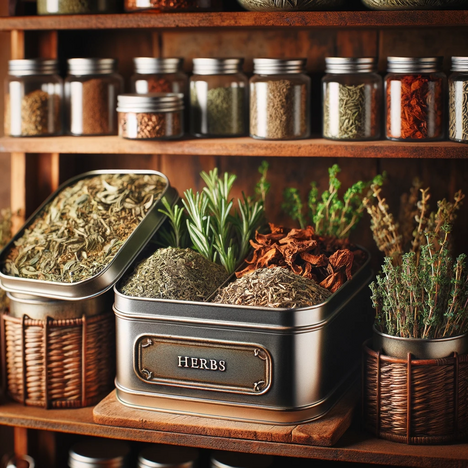Dried herbal plants

In the endless search for the best way to promote the health and well-being of our four-legged friends, many of us are turning to the power of nature. Dried herbal plants, prized for centuries in human nutrition and medicine, are now finding their way into the world of dog nutrition. But what exactly are dried herbal plants, and how can they benefit our dogs? At the same time, it's important to keep a critical eye on potential risks and drawbacks. This article dives deep into the topic to give you a balanced view on the use of dried herbal plants in dogs.
Introduction to the world of dried herbal plants
What are dried herbal plants?
Dried herbal plants are nothing more than the leaves, stems or flowers of plants that have been preserved by removing moisture. This process not only intensifies the taste and aroma, but also preserves the bioactive compounds that give the herbs their health-promoting properties. From parsley to rosemary to camomile - the range of dried herbs used in dog food is wide and varied.
Advantages: An herb for every ailment
Natural health promotion
Many dried herbs are rich in antioxidants, vitamins and minerals that can boost the immune system and contribute to a dog's overall health. Herbs such as chamomile can have a calming effect and aid digestion, while parsley is known for its fresh breath and detoxifying properties.
Versatile application possibilities
Dried herbs can be incorporated into your dog's diet in a variety of ways - whether as an ingredient in homemade dog food, as a healthy treat or as a natural supplement to commercial food. Their versatility makes them a valuable tool for individual nutrition plans.
Sustainability and simplicity
The cultivation and drying of herbs can be made sustainable, making them an environmentally friendly option in dog nutrition. In addition, dried herbs have a long shelf life and are easy to store, making them a practical part of the daily feeding routine.
Disadvantages: Not every herb is for every dog
Potential toxicity
While many herbs are safe and healthy for dogs, there are some that can have toxic effects. For example, garlic is toxic to dogs in large quantities. It is crucial to know exactly which herbs are safe and in what quantities they can be fed.
Allergies and intolerances
As with any new food ingredient, there is a risk of allergies or intolerances with the introduction of dried herbs. Careful observation of your dog after the introduction of new herbs is important in order to recognize negative reactions at an early stage.
Interactions with medications
Some herbs can interact with medications and strengthen or weaken their effect. A vet should therefore always be consulted before introducing dried herbs into the diet of a dog on medication.
Finding the right balance
Dried herbal plants can be a wonderful addition to your dog's diet to support their health in a natural way. The benefits range from improved digestion and fresher breath to a stronger immune system. However, it's important to find the right balance and consider potential risks. A well-considered selection of herbs, tailored to your dog's individual needs and health conditions, as well as consultation with your vet, are essential to take full advantage of the positive aspects of dried herbs without jeopardizing your dog's health. In this way, dried herbs can become a valuable part of a happy and healthy dog's life.
If you notice any signs of hypersensitivity or poisoning in your dog, you should see your vet immediately. We are not a substitute for a vet, but we try to be as accurate as possible. Every dog reacts differently and we recommend you get a second opinion or consult your vet if in doubt.
Stay healthy and take good care of your four-legged friend!😊